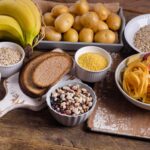Constipation can be a frustrating and uncomfortable experience. Fortunately, dietary adjustments can often provide significant relief. The key lies in understanding which foods promote healthy bowel movements and which ones hinder them. This guide explores What Foods Can Help With Constipation, offering practical advice and recommendations to get your digestive system back on track.
Fiber: The Cornerstone of Constipation Relief
Fiber is essential for healthy digestion and regular bowel movements. It adds bulk to the stool, making it easier to pass. Adults need between 22 and 34 grams of fiber daily, depending on age and sex. However, many people, especially older adults who may experience decreased appetite, fall short of this recommendation.
Consider consulting a healthcare professional or a registered dietitian to create a personalized meal plan ensuring adequate fiber intake. Remember to increase fiber consumption gradually to allow your body to adjust and avoid discomfort.
Here are some excellent sources of dietary fiber to incorporate into your diet:
- Whole Grains: Opt for whole wheat bread and pasta, oatmeal, and bran flake cereals.
- Legumes: Include lentils, black beans, kidney beans, soybeans, and chickpeas in your meals.
- Fruits: Berries, apples (with the skin on), oranges, and pears are fiber-rich choices.
- Vegetables: Carrots, broccoli, green peas, and collard greens are excellent additions to your diet.
- Nuts: Almonds, peanuts, and pecans provide a healthy dose of fiber.
The Importance of Hydration
Water plays a crucial role in easing constipation. It helps fiber do its job more effectively by softening the stool and making it easier to pass. Drink plenty of water and other fluids, such as naturally sweetened fruit and vegetable juices, and clear soups.
Adequate hydration is not only beneficial for constipation relief but also for overall health. Staying hydrated helps prevent dehydration, which can exacerbate constipation. Consult your healthcare provider to determine the optimal daily fluid intake based on your individual needs, health status, activity level, and climate.
Foods to Avoid When Constipated
Certain foods can worsen constipation. Limiting or avoiding these foods can help promote more regular bowel movements:
- Chips: These offer little to no fiber and can contribute to constipation.
- Fast Food: Often high in fat and low in fiber, fast food can slow down digestion.
- Meat: Especially red meat, can be difficult to digest and lacks fiber.
- Prepared Foods: Some frozen meals and snack foods are low in fiber and may contain ingredients that contribute to constipation.
- Processed Foods: Hot dogs and certain microwavable dinners are typically low in fiber and high in unhealthy fats and additives.
Conclusion: A Holistic Approach to Constipation Relief
While dietary changes are often effective in relieving constipation, it’s essential to take a holistic approach. This includes combining a high-fiber diet with adequate hydration and regular physical activity. If constipation persists despite these measures, consult a healthcare professional for further evaluation and guidance. Remember that consistency is key, and making gradual, sustainable changes to your diet and lifestyle can significantly improve your digestive health and overall well-being.

